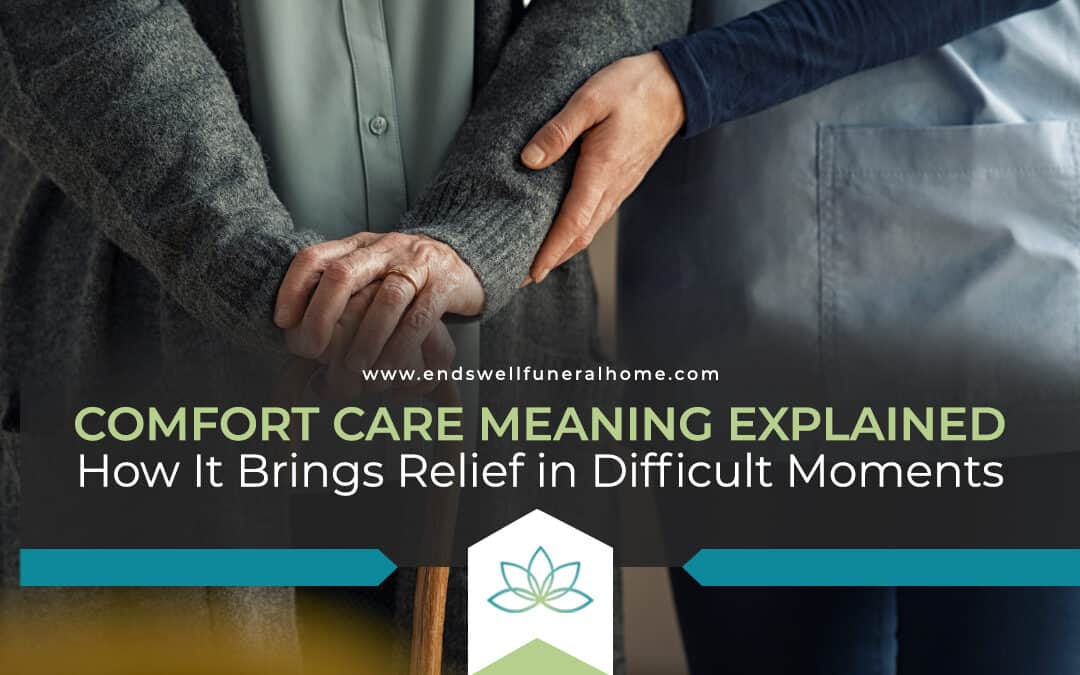When facing a serious illness, comfort care becomes a lifeline, offering more than just medical assistance. It’s about providing a level of care that truly addresses your needs—both physically and emotionally. In these challenging times, comfort care can provide respite, focusing on managing symptoms and alleviating pain so you can feel a sense of relief and peace.
Think of it as a bridge to comfort and support when you need it the most, emphasizing your well-being without aggressive treatments. As we explore what comfort care means, you’ll see how it can make these moments a little easier for you and your family.
Comfort Care Meaning Explained: What It Means for You and Your Loved Ones
When navigating serious illnesses, comfort care provides a path that prioritizes your quality of life above all. Whether you’re experiencing a terminal illness or managing chronic symptoms, comfort care is designed to offer relief from pain, emotional support, and compassionate care.
This support extends to both patients and families, emphasizing comfort over cure when the focus shifts from solely medical treatment to whole-person care.
But what does comfort care truly entail? Here, we’ll break down its meaning, the forms it takes, and how it integrates with other treatments, including curative approaches, to enhance your well-being.

What is Comfort Care?
At its core, comfort care is about prioritizing relief from symptoms and reducing suffering. Unlike aggressive medical treatments aimed solely at curing the disease, comfort care concentrates on your physical comfort and emotional well-being.
This doesn’t necessarily mean you’re no longer receiving medical treatment; rather, comfort care adds another layer, providing medications and other support to manage pain, nausea, and shortness of breath effectively.
It’s an approach that helps you find calm in the midst of your illness, allowing you to focus on what matters most to you and your loved ones.
Palliative Care: An Essential Part of Comfort Care
Palliative care is a form of comfort care that can be given alongside curative treatments. Unlike hospice, which usually begins when life expectancy is six months or less, palliative care can start early in your diagnosis.
This care is designed to provide symptom relief while you undergo treatments like chemotherapy or manage chronic conditions such as chronic obstructive pulmonary disease (COPD) or heart failure.
A palliative care organization typically works with your existing healthcare team to provide the physical, emotional, and even spiritual support that enhances your quality of life.
Hospice Care and Comfort at the End of Life
When an illness progresses to a point where curative treatments are no longer effective or desired, hospice care becomes a viable option. Hospice focuses on comfort during the final months of life, generally when the life expectancy is less than six months.
Under hospice, a team of professionals—doctors, nurses, social workers, and even spiritual counselors—joins together to provide a support system that emphasizes comfort and dignity.
This service often includes visits at home, in hospitals, or nursing homes, ensuring familiar faces and supportive hands surround you in the comfort of your chosen environment.
If you’re considering eco-friendly, compassionate, and transparent end-of-life options, Endswell Funeral Home is here to support you with care that honors both your values and your legacy.
Endswell provides resources for you and your family and we work closely with hospices to ensure that everyone is on the same page so we can provide comprehensive services.
Get in touch with Endswell at 919-907-9777 to discuss your options and start planning a farewell that reflects your life.

The Role of the Hospice Team and Family Members
The hospice team, including doctors, nurses, social workers, and volunteers, plays a crucial role in your comfort. They’re trained not only to address physical symptoms like pain but also to provide emotional and social support to both you and your family.
Loved ones can take comfort in knowing that trained professionals are there to help manage medications, offer guidance, and ensure the highest possible quality of life. Family members are also encouraged to be involved in your care, supported through education and resources that prepare them for each stage of the journey.
Benefits of Comfort Care: Quality of Life and Emotional Support
Comfort care extends beyond physical relief. Emotional support is a significant part of this approach, helping patients and families alike cope with the challenges of serious illness or approaching the end of life.
By managing pain and other distressing symptoms, comfort care allows you to maintain a better quality of life, focusing on moments with loved ones rather than constant medical interventions.
Families often find comfort in knowing that you’re at ease, with professionals who prioritize your wishes and comfort throughout.
Who Can Benefit from Comfort Care?
Anyone facing a serious or life-limiting illness can benefit from comfort care. Whether you’re managing symptoms related to chronic conditions or reaching the end of life, comfort care brings a form of relief that standard medical treatments may overlook.
By focusing on comfort, symptom control, and emotional well-being, this care ensures that you’re supported physically, emotionally, and spiritually, regardless of where you are in your treatment journey.

Palliative and Hospice Care in the Triangle
If you’re navigating serious illness or helping a loved one through the end stages of life, palliative and hospice care options in Durham, Chapel Hill, and Hillsborough offer critical support. These services emphasize comfort, symptom relief, and holistic care that addresses physical, emotional, and spiritual needs.
Providers in this area bring deep expertise, compassionate care, and individualized support to patients and their families. Understanding your options here in the Triangle can empower you to make the right choices for comfort and quality of life.
Palliative Care Services: Enhancing Comfort and Quality of Life
The Triangle is home to several respected palliative care providers who work alongside your existing medical team to ensure comfort and symptom relief. Palliative care here is available at any stage of illness, whether you’re undergoing curative treatment for heart failure or facing a chronic disease.
Doctors and social workers collaborate closely to manage pain and other distressing symptoms, making it possible for you to focus on meaningful moments with loved ones. These services often work with local hospitals to deliver comprehensive support, helping you maintain quality of life throughout your treatment.
Hospice Care: Compassionate End-of-Life Support
The Triangle offers a range of hospice care options for patients nearing the end of life. Hospice services here focus on comfort, ensuring that patients have relief from pain and other symptoms during their final months.
For those with a life expectancy of six months or less, hospice care brings together doctors, nurses, social workers, and spiritual counselors to create a supportive environment.
Many providers accept Medicare, which can cover much of the cost of hospice services, making it accessible for families looking for compassionate care for their loved ones. Hospice teams here often work in both home settings and hospitals, allowing you to choose the most comfortable environment.

A Holistic Approach to Palliative and Hospice Care
In the Triangle, you’ll find hospice and palliative care providers who take a holistic approach, addressing not only physical symptoms but also emotional and spiritual needs. This area emphasizes family involvement, ensuring that your loved ones feel supported and informed throughout the care journey.
Whether your loved one resides in a nursing home or at home, palliative care professionals work with families to provide essential emotional support, helping everyone involved navigate the challenges of end-of-life care.
Providers offer care that respects the patient’s wishes and prioritizes their quality of life. Some providers in the area include:
- Duke Palliative Care 919-668-7215
- Transitions Life Care 919-910-9770
- UNC Health 984-974-1000
- Visiting Angels 919-321-2136
Finding the Right Supportive Care Team in the Triangle
As you explore palliative and hospice care options in the Triangle, it’s important to find a team that aligns with your loved one’s needs and values.
In Durham, Chapel Hill, and Hillsborough, hospice and palliative care providers focus on creating a support system for both patients and families, helping to relieve the emotional burden that often accompanies serious illness.
With these services, you can be assured that your loved one is receiving care that prioritizes their comfort, dignity, and quality of life.
Whether you’re seeking support for symptom management, emotional counseling, or end-of-life care, the Triangle’s providers offer a range of options tailored to enhance comfort and ease through every stage of illness.

Planning for End-of-Life with Endswell
At Endswell Funeral Home, we understand that planning for end-of-life care can be one of the most important and challenging decisions you’ll make.
Our goal is to support you every step of the way, providing compassionate guidance and eco-friendly options that honor your values and the legacy you want to leave behind.
Here’s how we approach end-of-life planning with an emphasis on transparency, simplicity, and sustainability.
Choosing an Option that Reflects Your Values
Many of us now seek ways to ensure our final arrangements align with our beliefs and lifestyle. Endswell offers several green options, including:
- Low-emission cremation
- Aquamation, a water-based alternative to cremation
- Natural green burial services
Each choice minimizes environmental impact, allowing you to leave a gentle footprint on the earth.
For those interested in green burial, we partner with Bluestem Conservation Cemetery which offers natural burial spaces in a beautiful setting.
Understanding Our Transparent, All-Inclusive Pricing
Planning for end-of-life is already challenging; we believe financial clarity should be a given.
Endswell Funeral Home provides complete transparency in pricing, with all-inclusive packages that cover everything from transportation and documentation to the cremation or aquamation process.
For a straightforward experience, our cremation and green burial services are available for $3,000 each, while aquamation is offered at $3,500. This means there are no hidden fees, allowing you to plan confidently and focus on what matters most—honoring your loved one’s life.
Personalizing Your Farewell with Unique Urns and Memorials
We recognize the importance of creating a farewell that feels personal and meaningful. That’s why we feature an urn gallery showcasing over 300 locally crafted urns. Our Urn Gallery offers families a range of beautiful choices for memorializing their loved one.
By selecting an urn crafted by local artists, you’re not only personalizing a keepsake but also supporting the local community and its artisans.
Participating in a Community that Values Open Conversations about Death
At Endswell, we believe in creating a space where talking about death is part of life. Through regular workshops, monthly Death Cafes, and other events, we provide a supportive community where you can explore end-of-life topics openly and without judgment.
We’re part of the Good Death Movement and the Green Burial Movement, helping families reclaim the end-of-life process as a natural part of living.
Let Us Support You in Your Planning Journey
If you’re considering eco-friendly, compassionate, and transparent end-of-life options, Endswell Funeral Home is here to support you with care that honors both your values and your legacy.
Get in touch with Endswell at 919-907-9777 today to discuss your options and start planning end-of-life care that reflects your life and your values.

